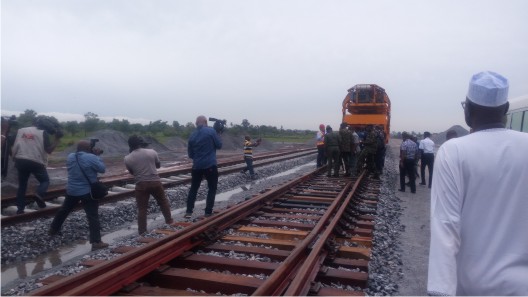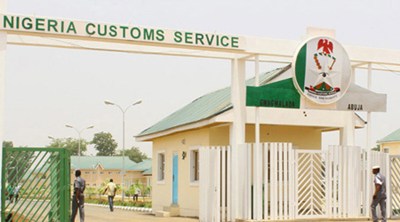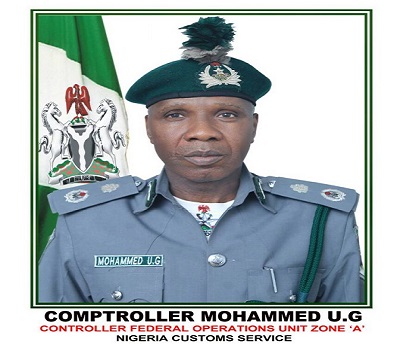Railway Revitalization: The Magic Wand of President Buhari’s Administration?
 By Oyeniyi Iwakun
By Oyeniyi Iwakun
The revitalization of the entire railway transportation systems in Nigeria via standard gauge construction and narrow gauge seem to be the flagship project of the President Muhammadu Buhari led administration. This project has been the mostly marketed by the transport ministry with huge capital investment and Nigerians have been hopeful of experiencing a new dawn in the transport sector, before the end of 2018 as promised by the federal government. The comfort that comes with modern train facilities is enough justification for the rare patience and understanding that Nigerians have given those at the helm of affairs who promised to deliver this project in no distant time.
Although, analysis on the massive infrastructural revolution in the railway transport sub-sector may not be complete without acknowledging the roles played by successive governments since the return to civil rule in 1999. Chief Olusegun Obasanjo’s regime gave the template and set the pace for the job while the Dr. Goodluck Jonathan’s administration is credited for commencing the execution of the project by initiating and successfully completing the Abuja-Kaduna railway with others in the offing, “although commissioned by President Buhari,” and finally the Buhari’s administration that has promised to make the interconnectivity of all Nigerian major cities with the railways a reality.
There are three major standard gauge rail lines that the Buhari’s government had set for completion before the end of their tenure. These rail lines; Lagos-Kano, Lagos-Calabar, Port Harcourt- Maiduguri is estimated to cost $46 million according to the Minister for Transportation, Rt. Hon Rotimi Amaechi and the project is expected to be executed in partnership with China Civil Engineering Construction Company (CCECC) and other investors who key into the project in the nearest future. Also the Narrow gauge which is about 3,505 kilometers and 115 years old is proposed for concession to an American consortium, General Electric (GE) who would rehabilitate, manage and operate it for some number of years. Not long ago, the Lagos-Ibadan segment of the Lagos-Kano standard gauge was projected to be completed, commissioned and used by December, 2018 while the Warri-Itakpe line was given June, 2018 timeline for completion according to the Nigerian transportation minister.
Abuja-Kaduna Standard Gauge
The Abuja-Kaduna rail project estimated to cost $874m, with $500m as a concessionary loan provided by China‘s EXIM bank and the remainder by Federal Government started in February 2011 and was completed in December 2014 by China Civil and Engineering Construction Company (CCECC).
As one of the first standard gauge railway modernization projects undertaken in Nigeria, with its commercial capital in Kaduna, the Abuja-Kaduna is a 186km line with standard gauge railway tracks from Idu, near Abuja, to Kaduna with nine stations and features both passenger and cargo trains.
The passenger trains can operate at a speed between 200km/h and 250km/h thereby reducing the travel time between Abuja and Kaduna to one hour and each passenger train can carry up to 5,000 commuters while the cargo trains, carrying 800t of goods, will take one and half hours to make the trip.
Dr. Goodluck Jonathan’s administration is credited for the Abuja-Kaduna railway project but the project was commissioned by president Buhari who also increased the capacity of the station.
Just around 5th of January this year, president, Buhari commissioned another set of trains to service the Abuja-Kaduna standard gauge due to high demand by passengers for additional trains,. So, in place of the initial four trains, there are now eight trains plying Abuja- Kaduna on daily basis from Monday to Friday except on Sundays that the trains run four trains. It means the demand at the Abuja-Kaduna had been addressed. This of course further painted an image of what a modern railway system would be in Nigeria.
Lagos-Ibadan Standard Gauge Construction:Components and Expectations
The Lagos-Ibadan railway project, is a section of the Lagos-Kano project and it’s 156.075 KM long. Apapa Port Port has been added to it so as to increase the traffic capacity and operation profitability. The project, located in South Western part of Nigeria, starts from Lagos, the largest port city in Nigeria, to Ibadan, the Oyo state capital. There are nine stations along the main line aside the Apapa harbor station: Lagos, Agege, Agbado, Kajola, Papalanto, Abeokuta, Olodo, Omi Adio, Ibadan and Apapa port stations.
The project quantities are: 24.26 million square meters earth work, 4 extra-large bridges, 11 large bridges, 4 medium bridges, 2 steel structure bridges, 10 frame bridges, 207 culverts, 40 railway crossing bridges, 31 pedestrian overpasses, 314.72 km main line rail, 60.26 km station rail, 708 32m-beams, 168 groups of single drive turnout, 4 groups of scissor crossover; 1,200,000 cubic meters of ballast.
Shedding more light on the project’s expectations when completed, Ameachi explained that a big train that has the capacity of moving people and freight for 160 kilometers per hour from Lagos to Ibadan and from Ibadan to Lagos is characterized the Lagos-Ibadan standard gauge. According to him, an express train that takes off from either Apapa or Ebutte Meta straight to Ibadan and then the one that will stop at all stations would be introduced depending on government’s financial capacity.
An inspection tours to the project en route the narrow gauge to Papalanto by MMS plus revealed a first- hand information and update on work progress. MMS Plus observed an ongoing massive construction up to Papalanto. The track laying had begun as at April, 2018 and it is expected to gather more momentum in months to come. There were two track laying machines as at the time of visit and each is expected to lay 1.4kms per day. A lot of equipments on site and hundreds of workers were seen at work.
The Agbado and Kajola stations’ residents who spoke with MMS Plus are optimistic about the project and they commended the federal government’s disposition at getting the job done. Some bridges and drainages on the verge of completion were seen as the other construction works were ongoing with art works completed.
Speaking to journalists at the Papalanto train station which also serves as the administrative headquarters of CCECC, during the train ride in May, the Minister of transportation who was in the company of his information counterpart, Alhaji Lai Mohammed expressed satisfaction at the work progress so far.
Amaechi identified some challenges that have been slowing down work progress in the past. These challenges range from challenges of utilities; water pipes, NNPC pipes carrying crudes and gas and petroleum on the right of way especially in Lagos heading towards the Apapa Seaport which may alter December, 2018, timeline set for getting the job completed as earlier stipulated even as he assured that federal government would still stick to the timeline.
The minster however explained after a meeting with CCECC and other stakeholders that resolutions had been made on how about 60% identified challenges would be ameliorated which included the disbursement of funds before the end of May, 2018 for the relocation of the army barrack at Yaba, Lagos to a temporary location pending the construction of a new one.
Lai Mohammed who was on the inspection entourage for the first time said he had visited to see the level of work done. In his statement, the information minister expressed confidence in the contractors who he said would deliver in tandem with the deadline given by the federal government.
He said “What we have said is that there are challenges and we are working to resolve them. We are not saying that we cannot meet the timeline. Of course, the federal government is still working towards meeting the timeline.”
Warri Itakpe-Warri and Coastal Rail Lines
The standard gauge from Itakpe in Kogi state through Ajaokuta, up to Warri in Delta state was abandoned for over twenty years but it’s currently under rehabilitation by the Buhari’s administration. The project when completed would mean that the central part of the country will now start enjoying the standard gauge railway line. Speaking with MMS Plus recently, the Director Public Relations, NRC, Mr Mahmoud Yakubu said the coaches to be used on that standard gauge are already in the country and they have been conveyed by road to Warri.
Responding to questions on the project’s timeline during the train ride to papalanto, Amaechi clarified that, although there are also internal challenges confronting it but he only promised a timeline of May, June and August for the project’s completion even as he assured that all other things was going smoothly and the project would be ready by August. “The NRC Managing Director told me that he used it from Warri to Uromi and I intend that before the end of the month I should be able to take a train ride from Itakpe to Warri. That doesn’t mean that we have completed it but it means that something is outstanding and we need to deal with what is outstanding” he said.
Amaechi said the coastal railway project which is Lagos-Calabar among other three rail lines has not been abandoned contrary to insinuations from some quarters, noting that he has presidential approval for all of them even as he said that he also has presidential backing to look for money to construct the port Harcourt-Maiduguri and Lagos-Calabar rail line which covers all other South-South Zones. He explained that he went to India and also in talks with Russian Exim Bank for the same purpose of funding and any of them that responds on Lagos-Calabar or Maiduguri to Kano would be taken.
NRC, Narrow Gauge and Private Investors’ Involvement
The Nigeria Railway Corporation is directly in charge if railway management in Nigeria under the transportation ministry. The incumbent railway management seems to be more technically sophisticated and informed about global best practices in railway management. In recent years, the railways operations had improved impressively and the railway transport mode have become more popular among Nigerians who often prefer to patronize the railway to other means of transport.
About four trains of 20 to 25 wagons of containers loaded are moved from Apapa to Ebutte eta Junction (EBJ) station every day. This is a new initiative aimed at decongesting the ports as a result of the ongoing Apapa port road rehabilitation. Apapa to EBJ station is over seven kilometers. For the passengers’ trains, NRC runs Kano to Lagos, weekly; Lagos to Kano weekly and Lagos to Ilorin, weekly; Offa to Kano, weekly; Kano to Offa, weekly; Aba to Port Harcourt, Daily; Minna to Kaduna thrice a week, Mondays, Thursdays and Sundays and others and they are all functional trains.
NRC also services Lagos and Ogun states excluding Sundays, either from Apapa to Ijokku, to Kajola and to Iddo, Ijoko and Kajola with about six trains, three returns on daily basis and it is relatively cheap. One would realize that every day, many people travel from Ijoko to Lagos Island and Mainland to work.
The NRC Managing Director, Engr. Fidet Okhiria and the management have been working assiduously with the transportation minister and other stakeholders by providing technical and professional support to ensure the no stone is left unturned to achieve the railway revitalization agenda. The revitalization project’s success recorded will be incomplete without their intellectual disposition and input to railways operations and management.
The transport minister noted that there is still the challenge of inefficiency with the narrow gauge because of the conditions of the tracks. While noting that the federal government is under pressure to complete the standard gauge project and everyone wants the standard gauge to run through his village. “They have politicized the railway construction” Ameachi exclaimed.
This is an obvious realization of the potentials in a modern and functional railway system by Nigerians who have been exposed to it by the incumbent leadership of the country. The minister explained that in order to solve this pressure, federal government has decided to rehabilitate the narrow gauge and have gone already to have $45million agreement with General Electric to do all rehabilitation jobs while negotiations for the main concession is ongoing. Although, MMS Plus isn’t availed with clarifications on the terms and conditions of the narrow gauge rehabilitation whether it is part of the concession or not, because Rt. Hon Ameachi stated that the concession itself hasn’t started, neither has it been concluded.
Ameachi assured that by the time the main concession is completed, GE would be bringing in $27billion to do total rehabilitation of about $700million and manage and run the tracks with about $2billion which includes the fact that they have to buy new locomotives, wagons and coaches for the narrow gauge and they are likely going to move more than 2 to 3 million cargoes per year which would translate into the removal of six million tons of cargos from the roads. “At least that would reduce the pressure on the road and that is done by the private sector.” He said
The narrow gauge track according to him can only do 16 to 17 kilometers per hour as it stance and when the challenges are fixed, it will be running at 80kilometer per hour which is the maximum for narrow gauge. “That would mean you can truck cargo from Apapa or Tin-can Island in a day to Kano and where it is to be dropped”. Amaechi explained.
Strategies and Funding
The Public-private partnership (PPP) strategy is being explored to develop the standard-gauge lines
When quizzed by journalists on this, Amaechi noted that government had been at the forefront of sourcing funds for the project “because there is nowhere in the world that railway is constructed with private money”. This he argued is not different from strategies adopted all over the world. He explained that individuals do not easily invest in a huge project like railway that is highly capital intensive because the dividends might not come out early.
“Even if it is 2 kilometers of way people are afraid to do the business of rail, in that they won’t recover their money fast. It will take your children to recover that money.” He said
He posited that, usually, the federal government of every country invests in railway but the likely change in strategy in Nigeria is that the government may borrow the money because what is required to construct the three rail lines is Trillions of Naira which the government doesn’t have in its coffers, hence, the need to source the funds from China, America, Indonesia and others. The transport minister was confident that the above stated strategies was the best for the project.
“For now the Chinese are funding Lagos to Kano but you must understand that this is cannot be finished in one day. No child is born in one day.” He said
Job Creation and Project’s Sustainability
The railway construction so far according the transport minister has created about 7000 jobs already and more is expected to be created in no distant time. In a bid to ensure technology transfer, the Nigerian engineers are made to understudy the Chinese so that the railways can be independently managed when the Chinese leave. “those who say we are not creating jobs are not being fair to us and those who say only Chinese are working here are wrong because I don’t think we have up to a hundred Chinese on this track”.
Amaechi however assured that the sustainability of the project is guaranteed even if it is not completed under the current regime because of the foundation laid and the level of work so far. “I don’t think any government can abandon our projects” he said





